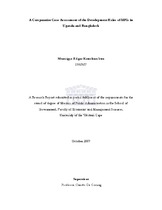| dc.contributor.advisor | de Coning, Christo | |
| dc.contributor.author | Kateshumbwa, Mwesigye Edgar | |
| dc.contributor.other | School of Government | |
| dc.contributor.other | Faculty of Economics and Management Sciences | |
| dc.date.accessioned | 2013-11-18T07:01:01Z | |
| dc.date.available | 2009/10/30 15:52 | |
| dc.date.available | 2009/10/30 | |
| dc.date.available | 2013-11-18T07:01:01Z | |
| dc.date.issued | 2007 | |
| dc.identifier.uri | http://hdl.handle.net/11394/2394 | |
| dc.description | Masters in Public Administration - MPA | en_US |
| dc.description.abstract | The overall objectives of this thesis were to assess the theory and evaluate the development roles of MFIs in Uganda and Bangladesh. The study in particular focused on MFIs impact on poverty reduction, empowering women, promoting health, as well as promoting children's education in Uganda and Bangladesh. The study preferred the selected countries because Bangladesh is internationally considered as the best practice for microfinance, whilst Uganda is assumed to be well-positioned in terms of microfinance as compared to other developing countries in Africa. The question that guided this empirical investigation was whether MFIs empower women, reduce poverty, promote children's education as well as health among its beneficiaries in Uganda and whether Bangladesh has important lessons of experience for Uganda. | en_US |
| dc.language.iso | en | en_US |
| dc.publisher | University of the Western Cape | en_US |
| dc.subject | Microfinance institutions (MFIs) | en_US |
| dc.subject | Microfinance | en_US |
| dc.subject | Development | en_US |
| dc.subject | Sustainability | en_US |
| dc.subject | Bangladesh | en_US |
| dc.subject | Poverty | en_US |
| dc.subject | Empowerment | en_US |
| dc.subject | Capacity-building | en_US |
| dc.subject | Uganda | en_US |
| dc.title | A comparative case assessment of the development roles of MFIs in Uganda and Bangladesh | en_US |
| dc.type | Thesis | en_US |
| dc.rights.holder | University of the Western Cape | en_US |
| dc.description.country | South Africa | |

